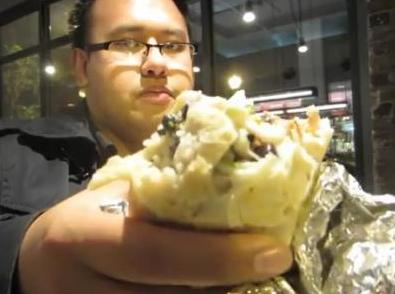This video has been making the rounds recently, to almost universal applause. But I’m not quite as in love with it.
http://www.youtube.com/watch?feature=player_embedded&v=ltun92DfnPY
Why don’t I like it? Well let me start out with some context: I was bullied as a kid. Since I’m not really sure how to quantify the extent of my bullying (do we have a Richter scale or something I could use?) I’ll just describe it.
I had no problems in elementary school. I had lots of friends and we all got along. But towards the end of 5th grade I remember things started to change. My friends started to get really worried about middle school and making sure they were prepared for it. They all started listening to mainsteam music on the radio, watching Saturday Night Live or late-night talk shows, and caring about their clothes and their language. I had no interest in any of that. I’d heard that they still had dodgeball in middle school, and so I was satisfied that we’d all have a good time. I completely missed out on the sense that I was supposed to be studying hard for the next level of social challenges. I was like the kid who really has no clue how important and hard a final exam is, and doesn’t even really grasp how hard everyone else is studying for it. Before 5th grade was over, the changes were minor, but when middle school started it was like I was from the wrong planet.

All of my closest friends from elementary school successfully made the transition to becoming the cool kids in middle school. I didn’t even know there was a transition to be made. They didn’t want to sit with me in class, eat lunch with me, or be seen in public with me anymore, and I didn’t know why. Not understanding the jokes or what clothes to wear didn’t phase me, but suddenly finding myseld discarded by my friends hurt. I tried to catch up, but I never got it right. I put too much gel in my hair one day, trying to make something of it, and the teacher happened to call me up to the front of the room for some kind of spelling bee practice. For some reason she put her hand on my head and recoiled, “What’s in your hair?” she said loudly. I was mortified as the class erupted into laughter, but not as much as when I realized she actually expected an answer. What happened to my hair? I don’t know, I was trying to look like kids on TV but I had no one to ask about it. I tried to make up a story about the bottle breaking that morning, but she kept inquiring–laughing the whole time–if I got too much stuff in my hair why didn’t I just wipe it back off?
As if I had a good answer for that.
I was the second-shortest boy in middle school, and usually the second-smartest. That’s not a good place to be. The shortest kid, Thomas, was under the constant watchful protection of popular girls who thought he was adorable. No one messed with him. The smartest kids got teased a bit, but they had some ammunition for return fire. I had nothing.
I remember vividly how my eyes would flicker from the floor to the faces around me as I scurried through the halls–head down–trying to avoid being tripped. My constant vigilance meant that I would usually be able to hop over the attempts without even stopping, but not always. Then I would fall, it would hurt, and everyone would laugh. Sometimes people stole my stuff, other times they vandalized it. Once, while I was in gym class, someone pulled small bits of jeans through the air holes in the locker and then cut them off, so that when I got back and changed my pants were basically Swiss cheese. My parents complained to the administration about that one, but were told that only nice kids went to that school, so surely I must have done it myself for attention. Once, in an effort to try hard enough not to be noticed in gym, I dove for the volleyball. We were playing inside, and I missed and then slid a few feet before cracking my head into the wall. The gym teacher, sitting in a tall chair at the height of the net, pointed and led the class laughing at me, tossing in a few quips about “using your head” and such. I even had my own run-in with social services, much like what was described in the video, although thankfully I was never actually taken out of my home.
So how bad does that bullying compare? I don’t know. I figure it was pretty bad, but it’s not like I think about it on a daily basis. It didn’t determine the course of my life.

Part of that is probably because when I found out that I could go to a magnet school for other nerds instead of going on to high school with the folks from my middle school, I leaped at the chance. I didn’t know anything about the magnet school other than that they only took a few kids from the middle school, but that was enought. By that point I would have done pretty much anything to escape from those kids. Luckily, the high school ended up being awesome. Most of the kids had been bullied, I think, and none of us had any interest in perpetuating that kind of social environment. As I remember it, there were no cliques and everyone was free to mingle with everyone else.
I didn’t realize this at first, so when I first started I stuck with the kids who played Magic: The Gathering. Gradually I started playing ultimate frisbee every day during lunch instead and met a new group of friends, but I still viewed the better-dressed kids with suspicion and fear. Eventually the negative reinforcement training from middle school faded, however, and I realized that they were just kids, too. By the time I was a senior I was completely at ease talking to kids who wore kilts or khakis.
As I learned to talk and relate to everyone, I came to learn that although bullying hurts so do a lot of other things in life. Kids get cancer, their parents get divorced, they regret losing their virginity, they have eating disorders, they become alcoholics, their girlfriends have sex with their best friends, they get raped, they are forced to have abortions they don’t want, their parents kill themselves, they go into withdrawal trying to quit cocaine cold-turkey. None of those examples are made up. I saw them all, and a lot of them more than once. I know at least three girls who were raped, for example. I had a friend who used to keep a razor blade in his mouth for self-protection in his neighborhood and a friend who lived out of her car while working full-time and going to high school to try and pay the mortgage for a house she was too busy to ever live in.
One of my close friends–a guy who’d endured a lot of similar bullying with me all the way back to our middle school days–hung himself in his closet a couple of weeks before his birthday. I remember my last conversation with him vividly. We were on the bus on the way home, and we were debating (as we often did) and I was happy because he had seemed so depressed for such a long time, and he seemed his usual, animated self that day. At least he did until the end of the conversation.
I don’t remember how we got there, but I remember that I felt like I had some kind of insight into what had changed i him over the months and years. “The thing about you,” I said, “Is that it’s not that you lack passion for things. It’s that the only thing you’re passionate about is nothing.” He stopped laughing then, and paused before he responded. Then he told me that I was right. It was a low note, and I was a little worried, but the bus had arrived at the local high school. We got off and went to the individual buses that would take us home and I didn’t think much more of it until I got a call later that evening that he had committed suicide. As far as I know, I was the last person to talk to him. I went to school the next day thinking I’d be OK, but when they announced it in my first class I lost control and started sobbing. There were kids just huddled together in the halls all day, and I can’t tell you how many new prescriptions for anti-depressants my friends got over the next few months.
Bullying hurts, but so does a lot of life. Somewhere along the way I stopped thinking that getting tripped in the halls was such a bad thing. I’m not saying that that is all bullying ever is, of course, and I’m not claiming to have suffered worse bullying than anyone else. I’m just saying that I don’t really like the idea of defining yourself around it. Does bullying scar kids for life? It probably does. So do a lot of things. While we’re at it–and this won’t make me a lot of friends–I think that the kids who do the bullying are doing it because they, too, hurt. Everyone hurts. Not just sometimes, but most of the time. What’s worse, a lot of the time we don’t know why it is that we’re in pain. Loss, disappointment, loneliness, fatigue, fear… all the varieties of pain are compounded by confusion.
If you were bullied as a kid and it hurt: I’m sorry. That sucks. But don’t go around thinking that your life is miserable and everyone else is carefree and happy. For as long as I let them, a lot of the kids in my high school seemed to want to confide in me. My parents would often hand me the phone (before there were cell phones) with a weary, “Another patient is on the line.” Finally I sort of stopped making myself available because it was more than I could take, but as long as I was willing to listen the one constant thing was this: everyone has a tragedy. No exceptions.
I don’t want kids who are bullied to think that what is happening to them makes their lives somehow surprisingly worse than others. It reminds me of the importance in not showing fear when a little child comes to you with a playground injury. Part of your job, in comforting them, is to remain calm. If they see the adult freak out at the sight of blood, then of course they will be terrified. I’m worried that turning bullying into some national cause is going to end up doing the same thing. I don’t want the pain and hurt of being bullied compounded by confusion or some terrible myth that people who aren’t bullied lead happy, carefree lives. They don’t. Some folks have it worse and some have it better, but getting bullied really has nothing to do with how bad your life is. There are so many other things that cause people to suffer. Bullying is just one variety, and it’s not anything special.


